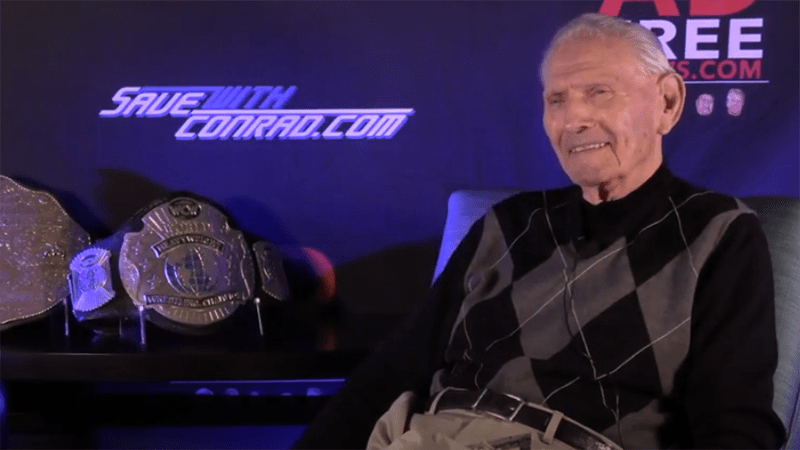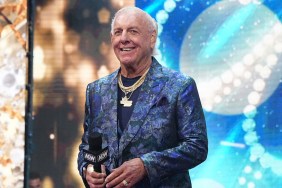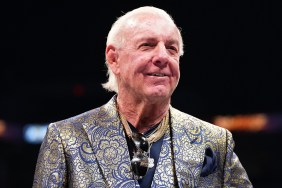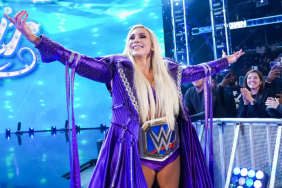Jim Herd is long removed from the pro wrestling business and you can certainly tell there’s a sense of relief.
The former WCW Executive Vice President sat down for a very rare interview with Conrad Thompson as a part of AdFreeShows.com‘s “Conversations With Conrad” and the Pizza Hut power man turned wrestling promoter talked about his former life in the wrestling industry. A major point in Herd’s tenure that ardent fans are familiar with is his relationship with Ric Flair and The Nature Boy’s eventual exit from the company.
Herd touched upon when he first took over and if he had a sense that WCW had to move on from one of wrestling’s biggest stars and arguably, the greatest to lace up a pair of boots. His mindset wasn’t primarily circled around Flair’s popularity, but how The Nature Boy lived the gimmick off the camera. That lifestyle wasn’t what Ted Turner was currently seeking for at the time.
“Ric was a guy that you couldn’t control out in public,” Herd said. “I mean he did a lot of different things that we didn’t agree with, Turner didn’t agree with and believe me during all this time, if you didn’t get a pass from Turner you didn’t get a pass at all because he controlled everything and through me. So I took the lumps where they came and as long as I maintained his dynamic which was making it rain dollars he didn’t interfere.”
Later on during the interview, Herd talks about Flair not wanting to drop the belt but Flair wants an extension of his contract while WCW wants him to take a pay cut. Conrad asks him what the reason was for the divorce: did he ask him to take a pay cut?
“I didn’t want to pay the same amount that I was paying at the time because I was getting pressured as far as money coming in so the dynamic never changed,” Herd said, who also clarifies that other top star Lex Luger wasn’t making the reported $600,000 a year. At the time, that was also something to be rumored as to what caused even more of rift between Flair and WCW.
“Luger never made more than [$240,000]. Never. So the difference between his contract and Ric’s contract was huge. You can try to make them all happy cause that’s what you want to do. You want a happy group so that they will work together and do the same things that we felt that we needed to do to attract the kind of eyeballs we need from around the United States to fulfill Turner’s ideas of what he wanted and that’s always in the back of your mind when you work for Turner,” who Jim goes on to praise. “He’s not only a visionary, he’s brilliant and you’ve got to always remember that he sets the rules, you abide by the rules and wrestlers don’t understand that, you know? ‘I set the rules and you as a wrestler abide by the rules,’ and Ric just finally, it just didn’t work with Turner’s deal.”
He was direct about his distaste for Flair’s lawyer at the time, Dennis Guthrie.
“I didn’t like him from the day I first saw him because he lawyer-esed me coming through the door and I said, ‘You may think you have all the tools, but I’m telling you one thing: my guy behind me has got the tools and that’s called cash.”
Ultimately, Herd does regret how things went down between Flair and he.
“Well, yeah I do. I always thought that Ric and I were friends. Actually, it turned out that I don’t think Ric ever really liked me that much so those things come to bear when you’re negotiating who’s gonna be the champion and who’s going to wear the belt and who’s going to get this much money and all those things come to the floor and whomever is in the middle between the ultimate money and the guys here is gonna take the brunt of the criticism and that was me.
Conrad talks about the criticism Herd received due to pivoting from Flair. He was in a tough position trying to find their next Hulk Hogan in Sting and Lex Luger because even though Flair was a massive name, his star power wasn’t doing the trick monetarily. That caused Herd to change the frequency WCW would be making in those familiar arenas.
“We were [losing money] up to a point and then when we decided to decrease the number of shows we did out in auditoriums and arenas and all, we started making money. Big time,” Herd went on to explain, “and it’s because we didn’t have all the travel and all of the setting up and all the advertising that goes with performing in St. Louis or Kiel Auditorium or United Center in Chicago. You got a lot of work to do and once we decreased our presence out in that arena, we started making money.”
A landmark moment for https://t.co/5v6Q3sv3sk & the entire wrestling community…is HERE! For the first time in 20 years, former WCW EVP Jim Herd sits down to talk about his experience in the world of pro wrestling. #ConversationsWithConrad
Full Interview https://t.co/1YwW7y4Ope pic.twitter.com/9SAxwuIJnl
— AdFreeShows.com (@adfreeshows) November 11, 2020
Conrad was curious about Dusty joining the booking team during that time and if that caused further tension between Flair. Herd touches upon more of Dusty’s mindset during that time.
“Number one, Dusty at that point had lost a lot of the energy that helped him become the star that he was and as I said before, Dustin came on the show, came on the scene, his son, he wanted to push his son,” Herd said. “I can”t blast a father to wanting his son to succeed but he was pushing Dustin to a point where he was hurting himself.”
Herd met with Flair at a Ritz Carlton on July 9, 1991 to try and salvage the relationship between The Nature Boy and WCW, but according to Herd, ego came into play.
“Well because as I said earlier, their egos wouldn’t allow you to settle anything. They wanted to be the top guy and they all wanted to make the top money and at some point you had to decide which one you wanted to go with.”
Herd does admit the lawyers at Turner Broadcasting played a factor in that particular meet-up in addition to trying to let cooler heads prevail.
“I think you’re right, the TBS lawyers were nervous about how you’re going to be sued and really as you relate to the belt, who owns the belt? The guy who won it fair and square or the circumstances surrounding the world’s greatest lie is hard for the lawyers to digest!”
Herd then talks about Flair infamously bringing the World Heavyweight Title over to WWF airwaves.
“Well, it was a slap in the side of the head. (Laughs) One of the things that happens in the game of the ‘Kayfabe’ of wrestling is that you finally get tired of listening and trying to settle seemingly unsettlable situations and you throw your hands up and say, ‘Hey, I’m going to go back and make pizzas.”
(Transcription credit should go to @DominicDeAngelo of WrestleZone)
Plenty more to come from this insightful and historical interview, but you can here the conversation in full by becoming a patron of AdFreeShows.com.
RELATED: Eric Bischoff Knows Bret Hart Wouldn’t ‘Trash’ The WWE Title In WCW After Montreal Screwjob







